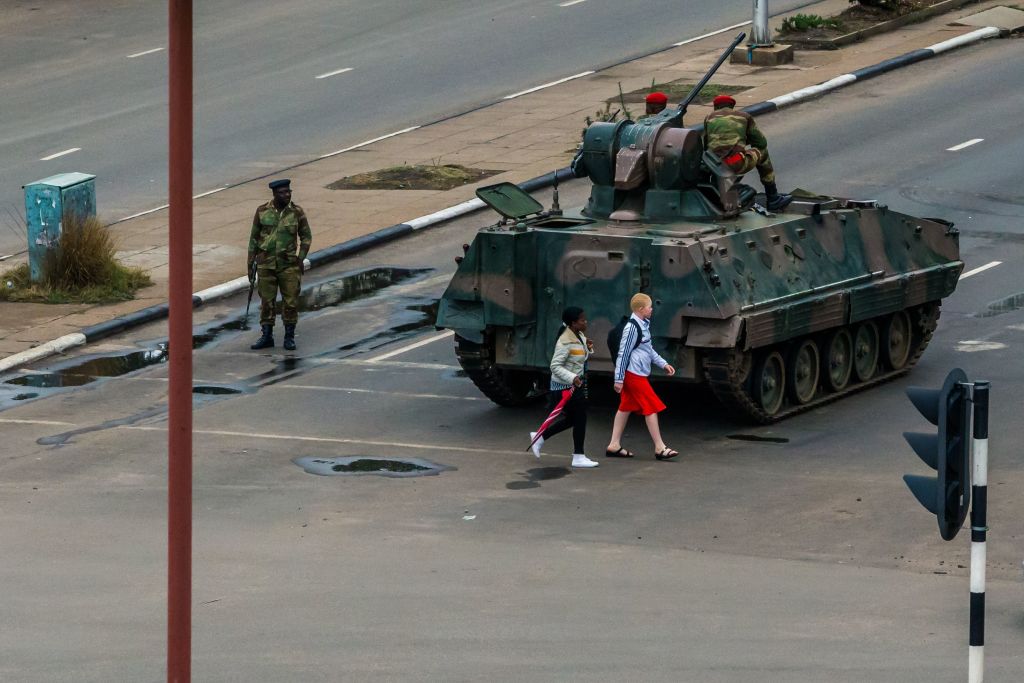Last week, I predicted that the Mugabe era was at its end and that all that remained was how, when and who? Well we now know: it was Emmerson Mnangagwa, it took just 48 hours and it was in the form of a disguised coup. The leadership of the G40 faction in the ruling Party has been detained, many are in hiding or on the run; some resisted and last night there was some gun fire and explosions. This morning there was a clear statement by the army that they have taken charge.
How did this happen? Mnangagwa has been in the Cabinet for 37 years, vice president for 3 years and a close confidant of Robert Mugabe for over 50 years. He fully expected to be named Mugabe’s successor after he engineered the Zanu-PF electoral victory in 2013, but instead was sidelined in favour of the then-vice president, Joice Mujuru. He never abandoned his ambitions, and in 2014 he engineered the ousting of Mujuru and took her place in the presidium.
Even then, Mugabe continued to play games and appointed a second vice president whom he stated was Mnangagwa’s equal. This was followed by a carefully orchestrated campaign to oust him, led by the younger leaders in the party and the wife of the president. This campaign culminated in an outburst and verbal attack on him at a rally in Bulawayo two weeks ago. This was followed that same week by a meeting between the president and the armed forces, where Mugabe informed them he was going to dump Mnangagwa. On Monday, the deed was done; when his close security was withdrawn, Mnangagwa fled the country.
After a whirlwind series of short trips and meetings, he reportedly met with the Commander in Chief of the armed forces, Constantine Chiwenga, in Johannesburg. Chiwenga then travelled back to Harare, where he was met by a military convoy who escorted him to his home. On Sunday, Chiwenga issued a five-page statement in which he said the army would not stand by while the state was captured by people who did not deserve that place. This was interpreted as an ultimatum to Mr. Mugabe.
On Monday, the president met with the Joint Operations Command (the JOC) and made little progress. On Tuesday, Mugabe chaired a long Cabinet meeting, and while this was underway the army moved. Heavy equipment and a battalion of troops entered the capital, Harare, and strengthened the presidential guard. By late afternoon, a full-blown exercise to take over the state was underway. During the night, gunfire and explosions rocked the northern suburbs; in the early morning, it was announced over state TV and radio that the army had taken control. The president is being held under protective custody at home and his wife has been allowed to fly out of the country. It is also rumoured that Mnangagwa returned to Harare yesterday afternoon.
I fully expect that Mr. Mugabe will shortly announce his retirement and the appointment of Mnangagwa as the new interim president of the Republic of Zimbabwe. One week, seamless, ruthless and virtually bloodless. Wow! Always something new out of Africa. The real question is what next?
This exercise has been long in planning and is being managed against a clear timetable and set of goals. Mnangagwa is a clever man (a full barrister at law) and a clever strategist. He is also ruthless and feared. He does not have a clean background and is partly responsible for several programs that involved gross human rights abuse and even genocide. But he is not known as a corrupt individual and certainly has a clear understanding of what is required to get Zimbabwe back on its feet.
He also knows that for this to happen will require the support of the international community. This will not be an easy call. Many countries will be very sceptical and cautious in their dealings with any post-Mugabe regime that does not have clear democratic credentials – credentials that Mnangagwa knows will be nearly impossible to secure.
For these reasons, it seems likely that a cabinet reshuffle will be on the cards this weekend, followed by negotiations to form a national government that can meet the case for credibility and real change. Providing this has the right individuals it may work. The future of Zimbabwe and the region depends on it.
Eddie Cross, a Member of Parliament for Bulawayo South, is a Zimbabwean economist and founder member of the mainstream Movement for Democratic Change party.






Comments